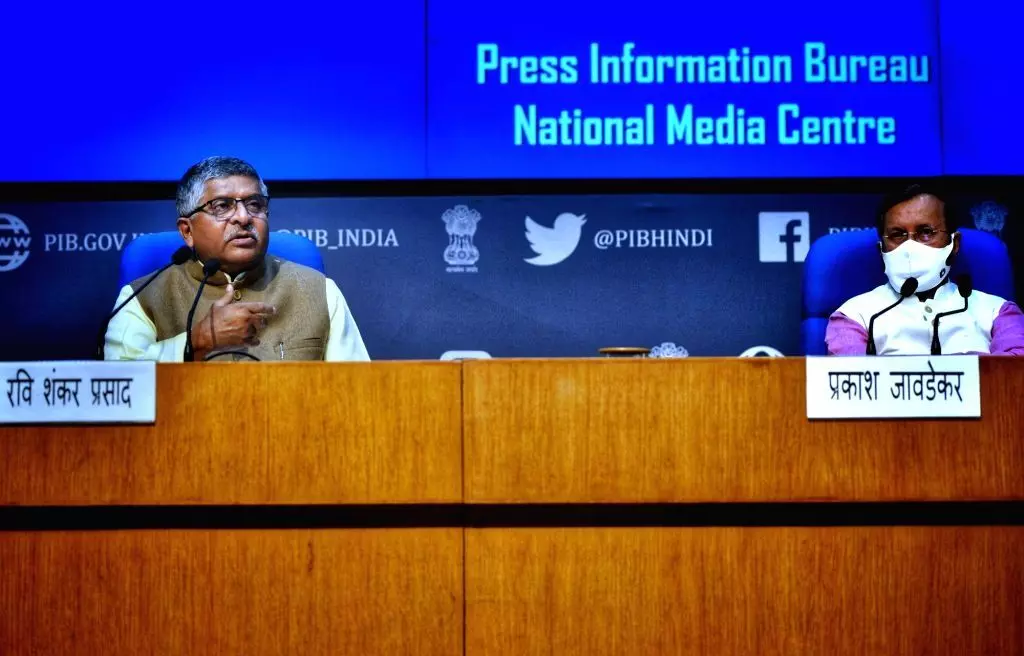
Towards a digital emergency?
text_fieldsMinister of Law and Information Technology Ravi Shankar Prasad and Minister of Information & Broadcasting Prakash Javdekar at the press briefing
Union Information and Broadcasting Minister Prakash Javdekar and Law and Telecom Minister Ravi Shankar Prasad on Thursday released the Information Technology (Intermediary Guidelines and Digital Media Ethics Code) Rules, 2021, which raises several serious questions. Since the Modi government came to power, its stances on freedom of expression and press freedom have been widely criticized. It is a characteristic of the BJP to view different opinions with intolerance and to suppress them. They have taken great leaps forward in conditioning the overall social atmosphere of the country in that regard.
The Modi administration and the BJP have successfully either bought up or intimidated mainstream print and electronic media. Currently, only social media survives as a ground for multiple opinions despite the Modi administration's attempts to eliminate dissent by employing all of the state's weapons. The Modi government has made several attempts to shut down or control social media. However, lack of strict laws has stood in the way of the Centre's failure to silence social media. Hence the introduction of the Centre's new rules that muzzle social media, and all its different forms. The new provisions raise doubts if the country is heading for a digital emergency.
However, all the provisions of the Rules have been drafted to look positive on the surface. One condition states that social media intermediaries are obligated to disclose the source of any message that appears to be malicious. Sharing such content is punishable by up to five years in prison -seemingly a good thing; the situation where anyone can say or write anything on social media, hiding behind the virtual cover, will change. However, if the meaning of malicious is not defined, it can only apply to all content unsavoury to the BJP and the government. Another provision is for an oversight committee consisting of representatives from the Ministries of Defense, Foreign Affairs, Home Affairs, Information and Broadcasting, Law and IT, which shall watch over social media.
The committee will have powers to call whoever it finds as breaking these rules. The government-appointed officer of a joint secretary rank will have the authority to recommend to censor or ban content. The guidelines also mandate separation/categorizing content based on age- for children or adults. This is something that is already existing and followed by most international media outlets. Another important point is the registration of new websites the like of which newspapers or other media earlier had to do earlier. This empowers the government to bring such websites also under the I& B Ministry and under the direct surveillance of the central government. The code of the Press Council of India, which now apply to newspapers, will also apply to websites. The new system is in line with the BJP's vision of a centralized form of dictatorship. The new rules also include provisions for regulating the widely accepted OTT platforms, that has been gaining more currency of late; OTT platforms shall have an overseeing committee headed by a retired High Court/Supreme Court judge.
The new rules align with Sangh Parivar's line of exercising greater power and restraint on opinions and expressions. Social media provides an opportunity for each person to express his views, stances and expressions to the public. At the same time, it should not end up as a medium for anyone to say anything without responsibility. Content that damages people's dignity and incites unrest in the country can be dangerous if it is spread uncontrollably. However, this concern can be effectively addressed, if the existing IT Act itself, with necessary amendments is effectively enforced, . Disha Ravi, an environmental activist, was arrested by the Central Government under Section 69 of the IT Act. That is, the existing laws themselves are sufficient to stem trouble, if necessary. But that is not the intention of the government. It is a legitimate concern that their actual intent is to suppress messages, information and people the regime does not like, using the cover of sedition and national security. Without strong and timely intervention from the people, the noose will get even tighter.






